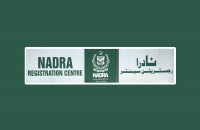Ray of hope: For the last two years, development at a standstill
New legal framework to enhance coordination and monitoring of INGOs.

PHOTO: FILE
A new legal framework has been drafted by the government to streamline mechanism of INGO’s working in Pakistan.
At Pakistan Humanitarian Forum’s report launch on Monday, Pierre Mayaudon, the deputy head of the European Union Delegation to Pakistan, said efforts are being made to streamline mechanism and operations of INGOs in Pakistan including the signing of a new agreement.
Speaking to The Express Tribune, he said, “This is a positive and encouraging signal from the new government. It will benefit all development sectors and civil society.” He added that a legal framework had been missing since 2009, as the previous one had become obsolete.

The new legal framework defines terms and conditions for international organisations operating in Pakistan and will be overseen by a committee that will fall under the Ministry of Science and Technology. “It is in the course of finalisation and we intend to contact international donors,” Mayaudon said.
The operating procedures of INGOs have deteriorated over the past years and they are facing serious image building issues since the Raymond Davis and Dr Shakeel Afridi incidents. The glossy 19 page report elaborates on the work of INGOs including long-term development support across the country, followed by a number of success stories. However, there is no mention of the major challenges and issues faced, particularly security, which remains one of the main concerns for international humanitarian field workers.
The most prominent examples are the kidnapping of Giovanni Lo Porto and Bernd Johannes, who worked for the German NGO Welthungerhilfe, from Multan. “No security means no development, no development means no security” said Mayaudon.
Journalist Talat Hussain said there was a trust deficit between the development sector and the media. He also said, “When INGOs are confined to creating fictional realities for people from posh hotels, nothing worthy can be obtained.” He suggested a need for collective effort in which the development sector could facilitate the media with their detailed data.

National Commission on the Status of Women Chairperson Khawar Mumtaz said that NGOs are unequally distributed in the country and there are formal as well as informal challenges embedded in the system.
According to the report, two per cent of humanitarian assistance and development budgets are currently invested for assessing risk and investigating in preventative measures, strengthening existing infrastructure and preparing communities to cope better with emergencies through Disaster Risk Reduction (DRR).
Pakistan Humanitarian Forum Chair and Country Director for Islamic Relief, Fayaz Ahmad, said that the report was presented today to highlight partnerships and explain the work of International community. He said that consecutive disasters were not letting the country develop and that “we are taking one step forward and two steps backwards.”
In 2012, a total of 53 INGO’s working under the PHF umbrella in collaboration with their local partners have managed to reach more than 19.7 million people across Pakistan
Published in The Express Tribune, August 21st, 2013.



















COMMENTS
Comments are moderated and generally will be posted if they are on-topic and not abusive.
For more information, please see our Comments FAQ